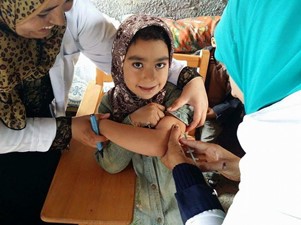 A young girl is vaccinated against measles/rubella as part of supplementary immunization activities in Egypt in November 2015
A young girl is vaccinated against measles/rubella as part of supplementary immunization activities in Egypt in November 2015
19 November 2017 – The Eastern Mediterranean Region has witnessed remarkable progress in measles control in the last 2 decades with several countries close to achieving elimination. A journal article entitled Progress towards regional measles elimination ‒ worldwide 2000‒2016, authored by WHO and published on 27 October 2017, indicates that during the period from 2000 to 2016, annual reported measles incidence in the Region decreased by 89%, from 90 to 10 cases per million persons, and annual estimated measles deaths decreased by 79%, from 55 300 to 11 400 deaths for the same time period.
Countries in the Region are at various stages of progress towards measles elimination. Three countries had no cases of measles in 2016 and incidence was less than 1 per million persons in 3 more countries and less than 5 per million persons in 7 countries. Although, 9 countries have experienced measles outbreaks with incidence higher than 10 per million persons in 2016, these outbreaks are of lower number of cases compared to previously experienced outbreaks.
The year 2010 saw the lowest levels of measles cases. In 1997, the Forty-fourth Session of the Regional Committee for the Eastern Mediterranean had endorsed resolution EM/RC44/R.6 to eliminate measles from all countries by 2010. To achieve this goal, countries have been implementing the regional strategy for measles elimination, focusing on achieving equal or more than 95% vaccination coverage with two doses of measles-containing vaccine (MCV) in all districts through routine immunization, supplemented by supplementary immunization activities where needed, and conducting high quality, case-based surveillance supported by proficient national laboratories.
The strategy has been implemented with variable degrees of success. Estimated coverage with first dose of measles-containing vaccine (MCV1) increased in the Region from 72% in 2000 to 81% in 2010. However, with the challenging situations in several countries in the Region, this coverage dropped to 77% in 2016. Among the estimated 20.8 million infants who did not receive MCV1 through routine immunization services in 2016 globally, approximately 3.8 million (18%) were in the Region, with around 2 million of these children in Pakistan. During 2000–2016, the number of countries providing a second dose of measles-containing vaccine (MCV2) nationally through routine services increased from 12 (55%) to 21 (95%).
To supplement relatively low routine measles vaccination in the Region, especially at subnational levels from 2000 to 2016, approximately 590 million doses of measles-containing vaccines were administered through mass immunization campaigns, implemented in all countries of the Region targeting different age groups in the different countries for individuals between 6 months and 40 years of age.
Twenty (20) out of the 22 countries in the Region have implemented measles case-based laboratory surveillance, supported by proficient national laboratories. Measles surveillance performance indicators showed that several countries met surveillance standards.
The decrease in measles mortality to around 11 000 deaths in the Region in 2016 is one of 5 main contributors (along with decreases in mortality due to diarrhoea, malaria, pneumonia and neonatal intrapartum deaths) to the decline in overall child mortality worldwide. However, the measles elimination target has not yet been met due to ongoing acute and protracted humanitarian emergencies in the Region that have resulted in a significant increase in the number of reported measles cases during the period 2011 to 2015 and the elimination goal was deferred to 2020.
Continued work is needed to achieve this goal. As the Region moves closer to eradicating polio it is important that the significant infrastructure and assets of the polio programme are used to benefit other development goals such as the elimination of measles and the strengthening of routine immunization programmes.
Related links
Progress towards regional measles elimination – worldwide, 2000–2016



